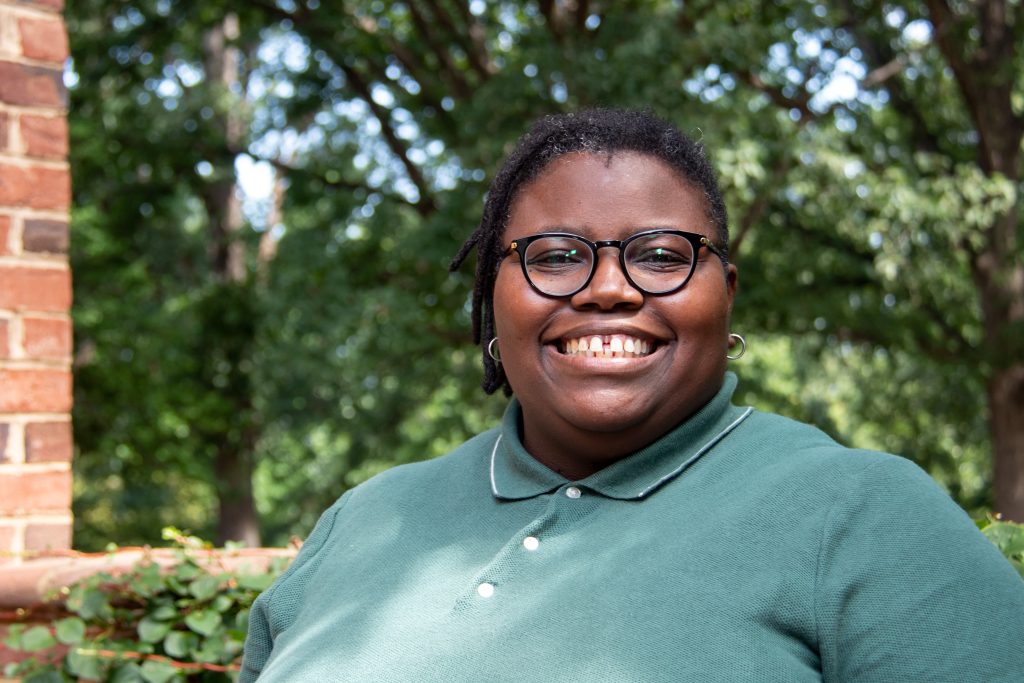Coffee Chat: Dr. Antonia Randolph, Assistant Professor of American Studies
Coffee Chat: Dr. Antonia Randolph, Assistant Professor of American Studies
Want to learn more about the faculty, students, and staff that make up the Department of American Studies? Follow along with our AMST/FOLK Coffee Chat series where we ask our community about new research, old hobbies, and everything in between.
This week we’re chatting with Antonia Randolph, Assistant Professor of American Studies specializing in diversity discourse in education, multicultural capital, non-normative Black masculinity, and the production of misogyny in hip-hop culture. Read on to learn more about her work, her hobbies, and the advice she values.
Q: Where’s home for you?
I’m from Philadelphia.
Q: How would you describe your research to an undergraduate?
I study how hip-hop culture thinks about interpersonal relationships between people, particularly between Black men in hip-hop culture. I’m writing this book about how Black men in hip-hop talk about their intimate relationships. So family, friends, romantic partners, and what gender has to do with it.
Q: Tell us about your latest project!
I’m writing this book that looks at how rappers think about their relationships to people, their intimate relationships, relationships that have to do with their emotional connections to people, so not business partnerships, although that kind of comes up. But how do they talk about their emotional relationships with people? And the book is arguing that hip-hop since the late 1980s has centered men’s bonds with other men and that those bonds structured their relationships with everyone else–so their family, their friends, their romantic partners–in a way that means that rappers turn to each other. Men in rap turn to other men as the ideal source for emotional and social support, and they have this kind of open tenderness between men in hip-hop that is unusual within dominant constructions of masculinity. So the book is called That’s My Heart because it’s a phrase that rappers use to talk about their male friends. “That’s my heart.” And it’s a very overt “I love you, man,” kind of thing. And that’s just not typical of how [within] traditional masculinity men show affection between each other. But the other part of that story is that because of patriarchy, because of male dominance and sexism, for men to hold on to claims of being just like other men–straight men–these kinds of male bonds are tied to antagonism towards women and towards gender non-conforming people, to queer people. Because masculinity in dominant Western culture is made up of men proving their distance from women and not seeming gay. But to have closeness to other men can make you seem gay, so “I’m going to ramp up the idea that women are lower than me, though, and gay people are lower than me, though.” So there’s a relationship between this open tenderness between men and what’s been called misogynoir or anti-Black racism combined with sexism towards Black women in hip hop culture.
Q: What is your proudest academic moment?
Proudest academic moment…it might be, this spring, I taught this class called North Carolina Black Feminisms, which is a first-year seminar that teaches Black feminist theory and practice through looking at seven figures who have ties to North Carolina. And it’s a continuation–I went to undergrad at Spelman College, a historically Black women’s college, one of two in the United States, and I took a class on Black feminist thought from Dr. Beverly Guy-Sheftall, and it just blew my mind. And I wanted to kind of share that. Hey, here’s this history of Black women and people assigned female at birth talking about feminism. There’s a sense that feminism is white people stuff, and here’s this whole class dedicated to the 1800s to yesterday about how Black women have talked about gender as a form of oppression. And so the class is sort of a love song to my training as a Black feminist scholar and trying to share that sort of stuff with students. Students at UNC are predominately from North Carolina, so I thought if I talk about feminism using Nina Simone or Pauli Murray or just other people in North Carolina, they would feel like, “Oh, I’m from Tryon.” Which is where Nina Simone is from, or, “I’m from Durham.” Pauli Murray is from Durham. “I have a stake in this.” And then hit them with some feminist theory. So, that’s probably my proudest moment.
Q: What music do you listen to?
These days I listen to a lot of indie rock. I just went to a Neko Case concert in Asheville.
Q: What hobbies do you have?
I go birdwatching. Not as much as I might like, but yeah, birding. For about maybe 15 years now, I’ve been going birding. My favorite bird is the American Coot, and I’m not even sure why. I just think they’re super cute. They’re not a duck, they’re a coot!
I do figure drawing. Every place I’ve lived, there has been a place for people who like to get together and sketch models, and so I do that when I have a chance to. Going to concerts. Going to art museums. Those kinds of things.
Q: Best piece of advice you’ve ever received?
The best dissertation is a done dissertation
Q: What is something you are looking forward to this academic year?
I’m on sabbatical right now, and I have to say, I was looking forward to this time off to finish a draft of this book because I’ve been working on these ideas for probably ten years, and so it’s nice to be able to get it all down on paper.

